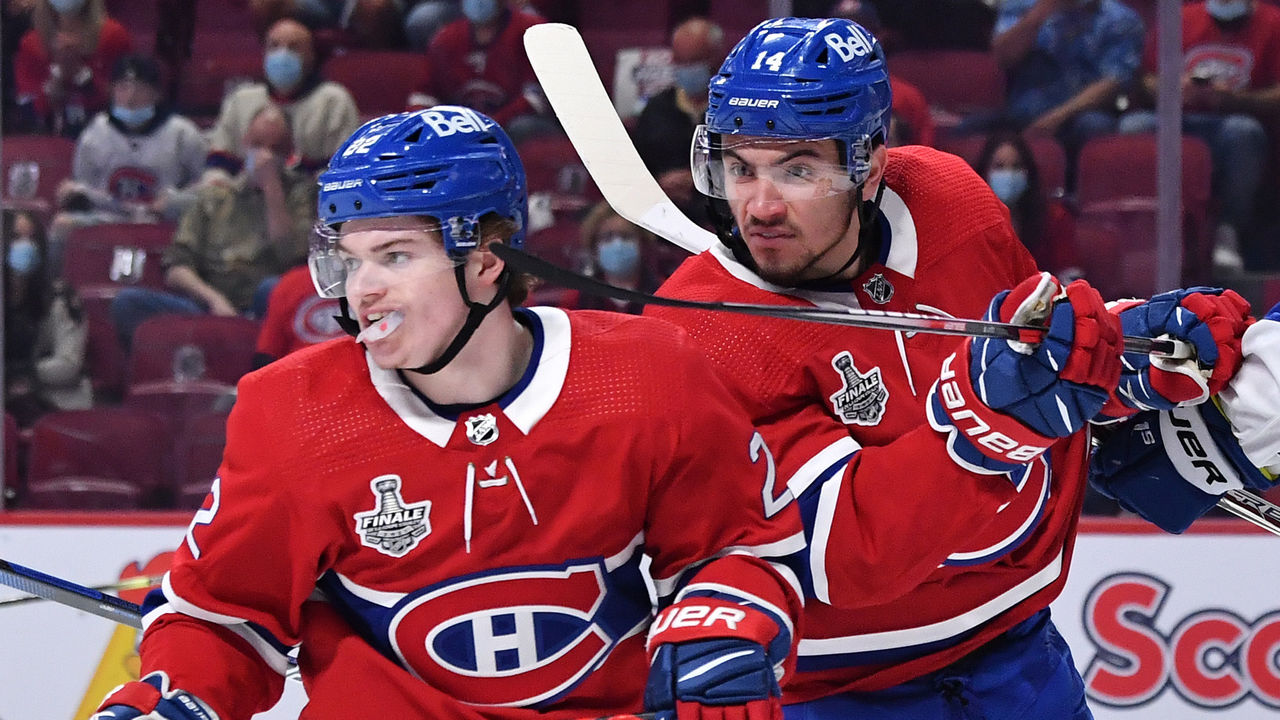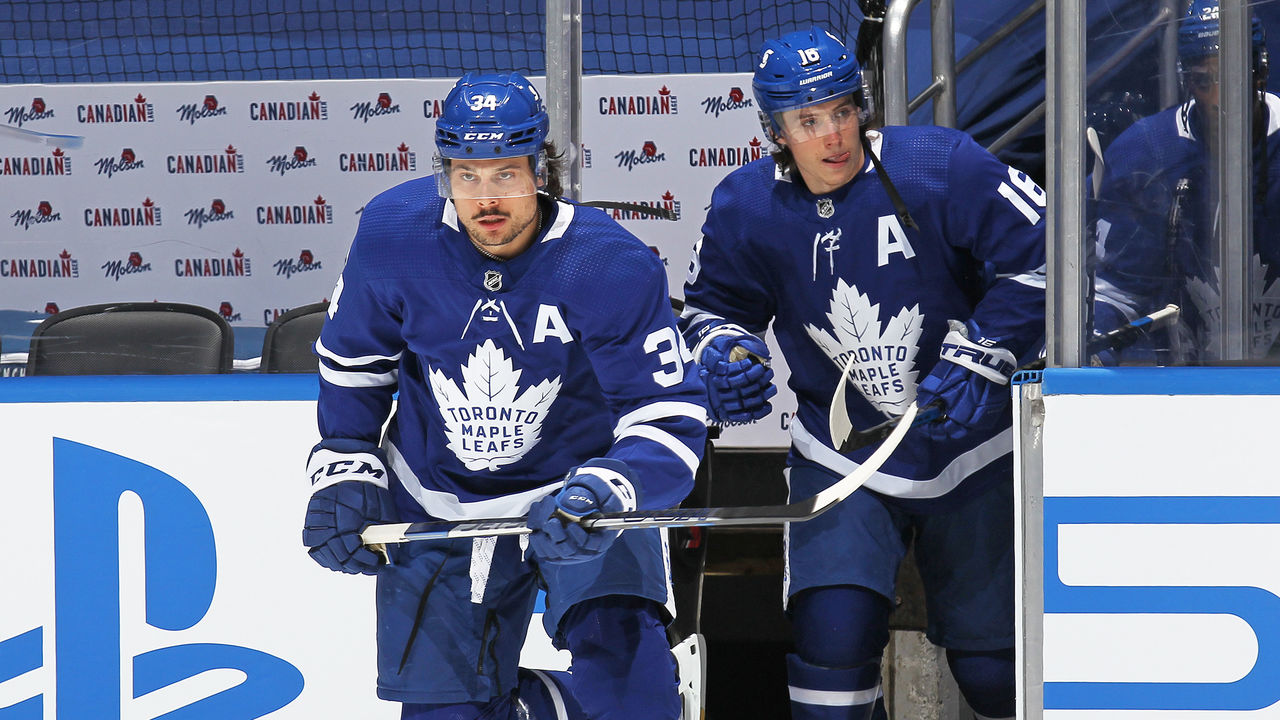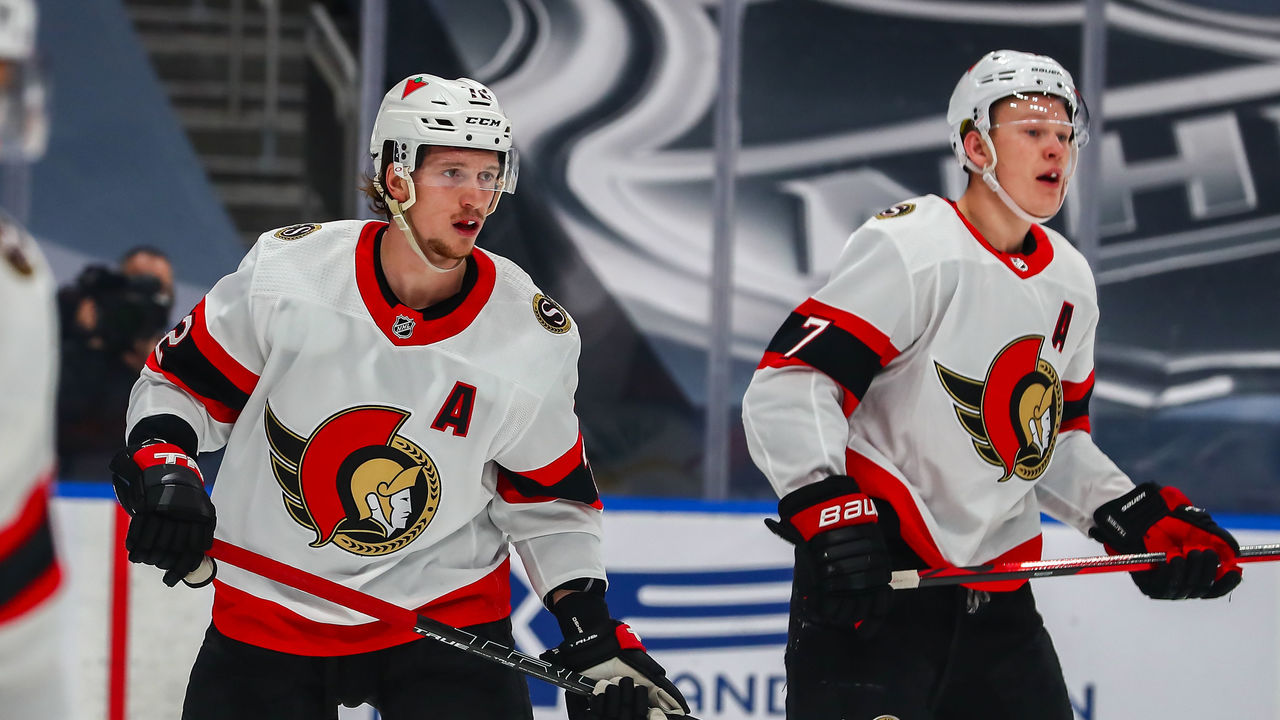Prove-it season: What's at stake for the Habs, Leafs, and Sens in 2021-22
In the surest sign that this NHL season matters across Canada, Pierre Dorion waxed optimistic. The general manager of the Ottawa Senators recently signed a contract extension, and when he spoke about the news, he asserted that his club has turned a corner: "The rebuild is done."
Even the Senators have playoff expectations in 2021-22.
Training camps are underway around the league, kicking off a pivotal year for the teams that briefly comprised the North Division. All seven have doubts to overcome or weighty objectives to fulfill. Ottawa bottomed out early in Dorion's GM tenure and fancies itself respectable again. The Montreal Canadiens just won three more playoff series than the Toronto Maple Leafs have in the salary-cap era. But Montreal's offseason was chaotic, and Stanley Cup finalists rarely repeat the feat.
On Friday, we'll cover why this season promises to be consequential for the Canadian franchises west of Ontario: the Winnipeg Jets, Edmonton Oilers, Calgary Flames, and Vancouver Canucks. For now, let's break down what Montreal, Toronto, and Ottawa are setting out to prove.
Can Montreal stay afloat in the Atlantic?

The North Division has disbanded and the Canadiens, fresh off charging as far as Game 5 of the Cup Final, must acclimate anew to life in the Atlantic. That would be the division that features the Tampa Bay Lightning, the NHL's back-to-back champions; the perennially good Boston Bruins and newly dangerous Florida Panthers; and the Leafs, playoff washouts who nonetheless played at a 100-point pace in three of the past four seasons.
The Detroit Red Wings and Buffalo Sabres figure to challenge for top odds in the draft lottery, so even if each of these heavyweights overtakes the Habs, they'd only need to beat Ottawa in the standings to contend for a wild-card berth against the middleweights in the Metro Division. Eke into the playoffs with a goaltender capable of greatness and victory is attainable in any matchup, as Carey Price proved in the spring against the Leafs, Jets, and Vegas Golden Knights.
Plenty has happened in Montreal since then. The Canadiens lost Phillip Danault to the Los Angeles Kings in free agency, Jesperi Kotkaniemi to the Carolina Hurricanes' cheeky offer sheet, and Shea Weber to a range of lower-body ailments that'll sideline the captain all season (and might force him to retire). Presented the chance to nab Price in the expansion draft, the Seattle Kraken instead selected AHL defenseman Cale Fleury.
When the dust settled, GM Marc Bergevin moved to acquire Christian Dvorak from the Arizona Coyotes, effectively offloading the draft-pick compensation he got from Carolina to plug a gap at center. Bergevin added Mike Hoffman and Mathieu Perreault up front and brokered a four-year deal with defenseman David Savard, Tampa Bay's main deadline addition in 2021. Price is expected to recover from knee surgery soon and Jonathan Drouin will return after missing the playoffs on personal leave.
Also back: Nick Suzuki and Cole Caufield, two of Montreal's three leading scorers in the postseason. They're the forwards who ought to anchor Les Glorieux for the next decade (barring any shenanigans when Suzuki hits restricted free agency next summer). But prolonging Montreal's contention window now is the priority, considering how many key players - Price, Savard, Jeff Petry, Ben Chiarot, Jake Allen - are into their 30s.
History suggests the Canadiens will struggle to mount another deep playoff run. No team that lost in the final has played for the Cup the following season since the Pittsburgh Penguins in 2009. The last runner-up even to reach the conference finals the next year was Tampa Bay in 2016.
More recently, the Habs went 17-11-8 last season against Vancouver, Edmonton, Calgary, and Winnipeg, the Canadian teams they no longer face frequently. That's a .583 points percentage. Can they come close to matching that standard against Tampa Bay, Boston, and Florida?
Was Dubas right to keep Toronto's core intact?

Six players who dressed for Toronto's Game 7 defeat to Montreal in May went on to leave the team in free agency, charting new courses with the likes of Edmonton (Zach Hyman), Boston (Nick Foligno), Florida (Joe Thornton), and Tampa Bay (Zach Bogosian). Alex Galchenyuk signed a PTO with Arizona, and when Frederik Andersen joined Carolina, Maple Leafs GM Kyle Dubas signed Petr Mrazek in what amounted to a straight goalie swap.
Some of these departures were significant, but they don't represent the reset some corners of the fan base craved after the Leafs bungled yet another first-round playoff series. Dubas stood pat despite this fresh low, declining to explore trade packages for, say, Mitch Marner or William Nylander as they and Auston Matthews prepare to enter a sixth season together.
Nick Ritchie and Ondrej Kase were brought aboard to provide scoring punch, but it's this simple: Winning in the playoffs comes down to how the core performs.
Dubas deciding not to blow it up reflected his faith in Matthews, Marner, Nylander, and John Tavares, and the reality that Toronto needs them to deliver. Marner has to wait until next May for the chance to snap his infamous 18-game playoff goal drought. The Leafs might have ousted Montreal before Game 7 had Tavares not been concussed and suffered a knee injury in the series opener. But what-ifs are cheap when players of their collective caliber command 49.7% of the salary cap.
Is any Cup contender under comparable pressure? Maybe the Colorado Avalanche, who've yet to reach the conference finals with Nathan MacKinnon. Maybe the Vegas Golden Knights, who were massive favorites to beat Montreal. Maybe the Hurricanes, who've knocked on the door for a few years now. Maybe Pittsburgh and the Washington Capitals, whose superstar leaders are squarely in their mid-30s.
Those answers are all stretches, though; Toronto is uniquely stressed. The Leafs know well that this doesn't guarantee victory, but the path to a playoff run starts with winning the Atlantic, which should lock in a favorable matchup in Round 1. Matthews' comeback from wrist surgery and the reliability of the Mrazek-Jack Campbell netminding tandem are storylines to track in the meantime.
Is Ottawa ready to keep rising?

When Dorion succeeded the late Bryan Murray as Ottawa GM in 2016, he inherited a team that came one goal short of winning the following year's Eastern Conference title. Then the franchise's fortunes tanked. The Senators dealt Erik Karlsson and Mark Stone in a fire sale and went on to compile the second-worst record in the NHL between 2017-18 and 2019-20. (The Red Wings earned seven fewer points in that span.)
Finally, the Senators are out of the abyss. They got hot in 2021 amid Vancouver's late-season COVID-19 outbreak and overtook the Canucks by one point, finishing out of the North basement. The Sens flushed their 2-12-1 start and made genuine strides as the season continued. Ottawa played .561 hockey over the remaining 41 games - a league-average mark - and ended the year on a 10-3-1 roll. Progress!
The Senators were free of expectations last season; crowds were barred from Canadian arenas and the team's standings deficit was insurmountable by February. Spectators are about to return, and if they were inclined to generously spot the Sens another season to grow before demanding results, Dorion pre-empted this by declaring the rebuild complete.
The implication: Ottawa doesn't need more high-end prospects to complement the established core of Brady Tkachuk, Tim Stutzle, Josh Norris, Drake Batherson, and Thomas Chabot. Tkachuk, whose RFA contract negotiations continue, led Ottawa with 36 points last season, which tied him for 85th in NHL scoring. The sooner these players boost their production a couple of notches, the smarter Dorion will look.
Improvement on defense needs to be coach D.J. Smith's priority. Ottawa ranked 27th in goals against last season, only slightly better than the prior three years. It's hard to see the Sens contending in the Atlantic until the blue line is equipped to trouble Tampa Bay and Toronto. Michael Del Zotto and Nick Holden were acquired as stopgaps, there to eat minutes until Jacob Bernard-Docker and Jake Sanderson make the leap from the AHL and the University of North Dakota, respectively.
Ottawa's best goaltenders last season were Anton Forsberg, Matt Murray's likely backup; Filip Gustavsson, who'll start for AHL Belleville; and Joey Daccord, whose play and expansion-draft exposure persuaded the Kraken to pick him. Murray ranked bottom five in the league in goals saved above expected, per Evolving-Hockey. If any Senator is embarking on a make-or-break year, it's him.
Nick Faris is a features writer at theScore.
HEADLINES
- Trade grades: Wild instantly become Cup contenders, Canucks score quantity
- McDavid: Smaller Olympic ice 'not a big deal'
- Bedard injured in final second vs. Blues on 'freak accident'
- Canucks GM: Hughes trade not because of a culture problem
- Trade grades: Oilers gamble on Jarry, Penguins make out like bandits